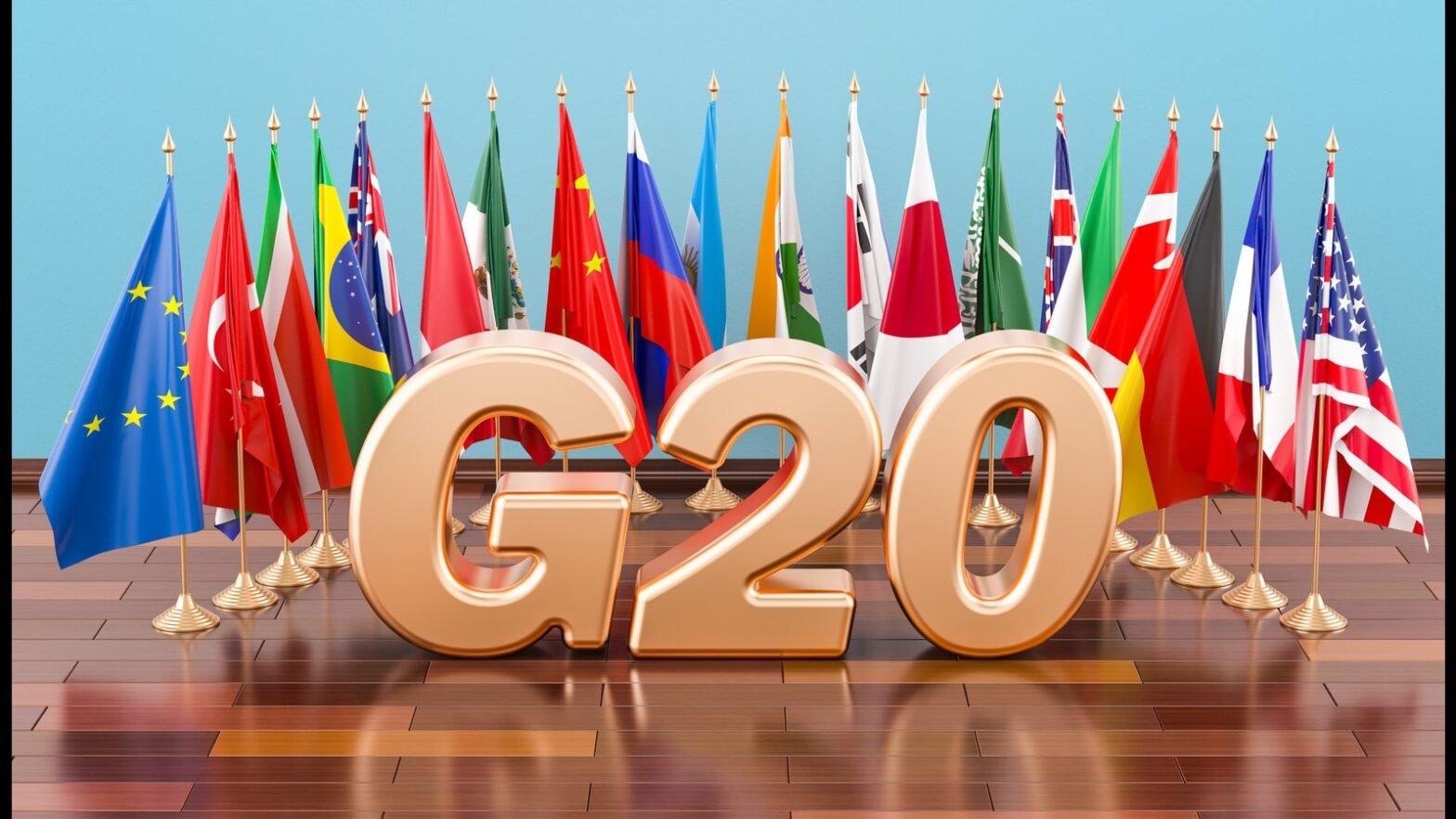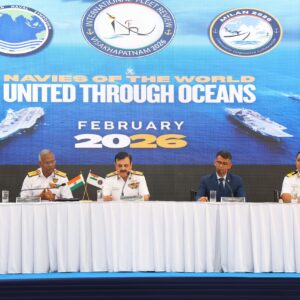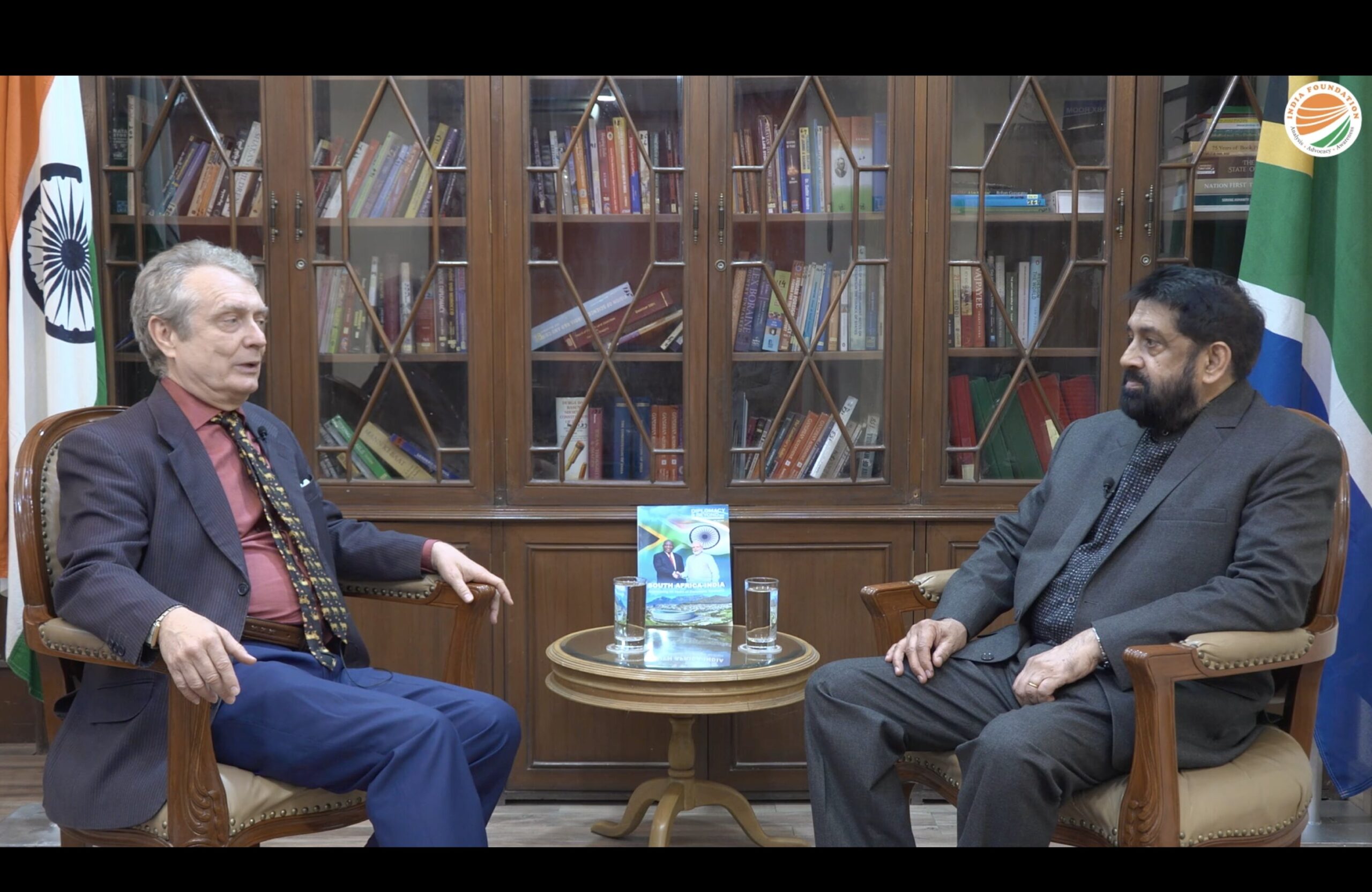Background
Created in the aftermath of the devastating World War II, it is important to underline that the United Nations and its Security Council as well as the Breton Woods institutions and the G7 reflect the world order which prevailed immediately after the World War II as well as the new power balance created by its victors. The G 20 is a reflection of an emerging order, which brings the G7 together with other major economies as equal partners. It also includes the P5 with other major emerging economies.
Conceived as an international mechanism for governance of the global economy, the G20, which includes all the major economies, has evolved over time into one of the most powerful economic and financial groupings. At present, it comprises 85% of global GDP, 75% of international trade and two/thirds of the global population. It represents the world’s key body for handling global economic and developmental issues.
Held under a rotational Presidency on an annual basis since 2011, the G20’s initial focus was on broad macro-economic policy. Formally known as the “Summit on Financial Markets and the World Economy”, the G20 has made continuous efforts until the pandemic toward achieving robust global economic growth. It re-doubled its efforts after the pandemic. More recently, the G20 focus shifted to include a wide range of global issues including climate change and energy, health, counter-terrorism and migration.
What is the composition of the G20? It comprises 19 countries (Argentina, Australia, Brazil, Canada, China, France, Germany, India, Indonesia, Italy, Japan, Republic of Korea, Mexico, Russia, Saudi Arabia, South Africa, Turkey, UK and USA) and the European Union (EU). It has become a relevant and influential global grouping. The regular participation of international and regional organisations such as the African Union, NEPAD and ASEAN as invitees in the G20 process makes it both inclusive and representative.
The G20’s initial focus was on financial and socio-economic issues. Since it was raised to the level of Heads of State and Government, the G20 has evolved to address every contemporary issue and challenge. There are 20 Working Groups between the Sherpa and Finance Tracks and 10 Engagement Groups, which bring together the civil societies, think tanks and other key stakeholders of the member countries.
Existing G20 Tracks
The G20 currently comprises several tracks including:
-‘Finance Track’, with 8 work streams (Global Macroeconomic Policies, Infrastructure Financing, International Financial Architecture, Sustainable Finance, Financial Inclusion, Health Finance, International Taxation, Financial Sector Reforms).
-‘Sherpa Track’, with 12 work streams (Anti-corruption, Agriculture, Culture, Development, Digital Economy, Employment, Environment and Climate, Education, Energy Transition, Health, Trade and Investment, Tourism). Shri Amitabh Kant is the Indian Prime Minister’s Sherpa for this period.
-‘10 Engagement Groups’ of private sector/civil society/independent bodies (Business 20, Civil 20, Labour 20, Parliament 20, Science 20, Supreme Audit Institutions 20, Think 20, Urban 20, Women 20 and Youth 20).
India’s Presidency
India has been a member of the G20 since its inception in 1999. As an important member of the grouping, India ensured that its perspective on issues of vital national importance did not go unheard in the global financial narrative. India will be assuming chairmanship of the G20 for one year from 01 December 22.
India’s Presidency comes at a watershed moment coinciding with a period of flux, internationally. The global community is facing multiple challenges, politically and economically. The Russia-Ukraine conflict has vitiated relation between Russia and the industrialised Western countries, most of which are members of the G20. The conflict and the resulting unilateral sanctions imposed by the West has upset the post pandemic global recovery, sharply impacted oil and gas prices as well as food availability. As always, the impact is felt most sharply by the most vulnerable, the developing countries and LDC’s.
India would, in the true spirit of Vasudhaiva Kutumbakam (the world is one family), seek to find pragmatic global solutions for the well-being of all. India’s vision for the global development agenda is shaped by the rapid transformation of its economy and society launched by the Prime Minister, particularly green and digital transformations. The after-effects of the pandemic are also of importance, as it underlined the importance of resilient healthcare and global co-operation.
PM Modi has transformed India’s foreign policy to focus on the ‘global common good’. Through its G20 leadership, India hopes to extend this principle towards finding sustainable solutions to some of the key global challenges emerging out of the interconnectedness of the world, such as climate change, new and emerging technologies, food and energy security, etc. As the incumbent G20 President, India will set the agenda, identify the themes and focus areas, conduct discussions and deliver the outcome documents. India will identify, highlight, develop and strengthen international support for priorities of vital importance in diverse social and economic sectors, ranging from energy, agriculture, trade, digital economy, health and environment to employment, tourism, anti-corruption and women’s empowerment, including in focus areas that impact the most vulnerable and disadvantaged.
India is currently part of the G20 Troika (current, previous and incoming G20 Presidencies) comprising Indonesia, Italy and India. From December 22, during India’s Presidency, Indonesia and Brazil along with India would form the Troika. This would be the first time when the Troika would consist of three developing countries and emerging economies. It is hoped that as a result there would be a shift in the balance of power within the G20. It is time for emerging economies to have a greater share in decision making at this grouping.
India will host the G20 Leaders’ Summit at the level of Heads of State / Government on 9th and 10th September 2023, in New Delhi. Under its Presidency, India is expected to host over 200 G20 meetings across India, commencing from December 2022. India is preparing to hold up to 190G20 meetings on a pan-India basis. In our effort to organise an Impeccable and Uniquely ‘Indian’ G20, we strive to take this mega event closer to the lives of the people of India making it ‘People’s G20’.
Establishment of G20 Secretariat
A G20 Secretariat has been established with Cabinet approval. Former Foreign Secretary Harsh V. Shringla has been appointed as India’s chief G20 Coordinator at Secretary Level. His tenure commenced on 1st May 22 till 31st December 23. The G20 Secretariat will be responsible for implementation of overall policy decisions and arrangements needed for steering India’s Presidency.[i]
The Secretariat will be responsible for smooth transition from the previous Presidency, preparations and conduct of all G20 meetings during the year, consultation and coordination with stakeholders and finally handing over to the next Presidency in December 2023. The Secretariat will also enable capacity building, including knowledge and expertise, for supporting India’s leadership on and contribution to global issues in multilateral forums in the years ahead.
The Secretariat will handle work relating to knowledge, technical, media, security and logistical aspects of the Presidency. The Cabinet Secretariat said in a statement: “It will be manned by officers and staff from the Ministry of External Affairs, Ministry of Finance, and other relevant line Ministries/Departments and domain knowledge experts. The Secretariat will be functional till February 2024”.
The India Trade Promotion Organisation (ITPO) has almost completed re-development of Pragati Maidan for setting up of a world class Integrated Exhibition-cum-Convention Centre (IECC) at a cost of Rs 2254 crore. It is the venue of the Summit.[ii] The Government has commenced the process of recruitment to the Secretariat. In a tweet citing a tweet by Ministry of External Affairs Spokesperson Arindam Bagchi confirming that recruitment had started, Prime Minister tweeted: “This is an exciting opportunity…”[iii]
In accordance with past tradition, the Presidency usually invites some ‘Guest’ countries and International Organisations (IOs) to its G20 meetings and Summit. MEA has announced that as President, India will invite Bangladesh, Egypt, Mauritius, Netherlands, Nigeria, Oman, Singapore, Spain and UAE as ‘Guests’. Bangladesh is the only South Asian neighbour invited as ‘Guest’ to the Summit.
Further, in addition to regular International Organisations (UN, IMF, World Bank, WHO, WTO, ILO, FSB and OECD) and Chairs of Regional Organisations (AU, AUDA-NEPAD and ASEAN), India, as G20 Presidency, will be inviting as ‘Guest IO’s’ the ISA (International Solar Alliance), the CDRI (Coalition for Disaster Resilient Infrastructure) and the ADB (Asian Development Bank).
Priorities of the Presidency
What would be the priorities of the Indian Presidency? According to MEA: “Ongoing conversations…revolve around inclusive, equitable and sustainable growth; LiFE (Lifestyle For Environment); women’s empowerment; digital public infrastructure and tech-enabled development in areas ranging from health, agriculture and education to commerce, skill-mapping, culture and tourism; climate financing; circular economy; global food security; energy security; green hydrogen; disaster risk reduction and resilience; developmental cooperation; fight against economic crime; and multilateral reforms.”[iv]
Among its key priorities are climate, digital and health. The Presidency provides an opportunity to showcase India’s leadership inter-alia in climate action and climate commitments. Prime Minister Modi has pointed out that India’s dedication to climate commitments is clear. India has achieved the target of 40% energy capacity from non-fossil sources, nine years before the deadline. At the COP26 Summit last year, Mr Modi announced the ‘Panchamrit’ or five major areas of climate action commitments by India, including creating a net zero economy by 2070. Access to climate finance and technology would be critical in facilitating these ambitious goals particularly for developing countries.
Prime Minister emphasised the importance of behavioural change for catalysing climate action and highlighted the need for collective action by the global community as part of a movement called LIFE – Lifestyle for Environment. These are most relevant for the G20 today. On digital, India hopes that our start-up sector and our proven capabilities to create tech models that balance the need for global integration and priorities at a national level can be internationalised. Digital India would go global. A new tech order must combine cross-border flows of technology and investment with development and growth aspirations.
On health, India has demonstrated new and innovative approaches to tackle complex challenges including Covid 19. India’s efforts to track the COVID pandemic’s spread relied on the success of the Aarogya Setu digital platform. India’s successful vaccination campaign which saw 2 billion vaccines administered across our populace, was underpinned by the Co-WIN digital platform. Under India’s Presidency, efforts would be made with other G20 partners to create mechanisms that strengthen the capacity of developing countries to tackle health crises like the Covid19 pandemic.
The Indian Sherpa
The Sherpa plays a crucial role in ensuring that the priorities of the Indian Presidency under P M Modi are supported by G20 member states. India’s G20 Sherpa, Amitabh Kant, is an officer of the Indian Administrative Service (IAS), who headed the NITI Aayog for last month six years before his selection as Sherpa by PM. He is supported by the G20 Secretariat.
Kant led an official Indian delegation to the third G20 Sherpa meeting of Indonesia’s G20 Presidency, held in Yogyakarta from 26th to 29th September 2022. (The first Sherpa meeting under the Indonesian Presidency was held in December 2021 and the second in July 2022). At the meeting, according to MEA: “Amitabh Kant reaffirmed India’s commitment and active support to Indonesian Presidency’s efforts…He emphasised the need for G20 to bring enhanced global focus on and strengthen international cooperation and efforts in key priority areas such as sustainable growth, accelerated progress on SDGs, addressing climate change including through Lifestyle for Environment (LiFE), tech-enabled development and digital public infrastructure, multilateral reforms and women’s empowerment”.[v]
Significantly, Kant also highlighted Prime Minister Modi’s recent statement on 16 September: “Today’s era is not of war… diplomacy and dialogues are things that touch the world”. On the sidelines of the G20 Sherpa meeting, Kant held bilateral interactions with his visiting Sherpa counterparts from Brazil, France, Germany, Japan, Russia, Saudi Arabia, South Korea, Spain, UK and USA. According to informed sources, the Indian delegation led by Kant through its constructive interventions was able to infuse greater positivity and optimism in G20 deliberations, in preparation for the Indian Presidency.
Challenges Identified by the Sherpa
On 5th September 22, on Twitter, Kant provided a unique insight into PM Modi’s vision for the Indian Presidency. He gave a broad-brush perspective on the core issues of importance noting: “India believes that the G20 countries must close ranks and work together. While the agenda and priorities for the Presidency are still evolving, India is committed to focussing on issues of critical importance to the world[vi].
The world is facing huge challenges due to post pandemic blues, debt distress, food and energy security and the triple planetary crisis of climate change, biodiversity loss and pollution, along with instability and conflict that are impacting people globally.
The global development agenda is facing monumental challenges at present. The pandemic came on the eve of “Decade of Action” and has disrupted decades of developmental progress globally on many fronts. These effects are compounded by the additional effects of ongoing conflict in Europe. India believes that a conversation on economic growth with sustainability is the need of the hour. The G20 should lead the discussion on how countries can work together to ensure return to economic growth, but one which is rooted in sustainability and sustainable lifestyle.
The concept of LiFE was introduced by PM Modi during the 26th UN Climate Change Conference of Parties (COP 26) in Glasgow 21. India hopes to highlight LiFE as a critical focus area for discussion and action during our Presidency. India believes that digital technology and digital public platforms are key to deepening engagements of government with citizens. Our belief is that digital identity, content-based framework and payments are key building blocks for a digital future. Digital solutions to traditional problems have transformed and elevated the lives of people across the world. During India’s Presidency, we would like to help take this discussion forward.
We aim to deliver outcomes in areas of critical intent such as integrating the climate and development agenda, accelerating progress towards achieving the 2030 agenda, furthering development cooperation, supporting small and marginal farmers, enhancing food security and nutrition, addressing global skill gaps, promotion of blue economy and coastal sustainability, digital health solutions, green hydrogen and tech-enable learning.
India also hopes to bring into the G20 discussions a focussed conversation on Disaster Risk Reduction (DRR). The average annual loss from disasters globally is approximately USD 218 billion. We believe that a working group on DRR would help the global efforts in reducing the loss of life and livelihood. India believes that the G20 countries must come together to deliver on matters of crucial importance to the world and not let the Russia-Ukraine crisis dominate the broader agenda. The G20 should show the necessary leadership and flexibility to accommodate differences among its members to effectively deliver outcomes”.
While concluding, Kant stated: “The G20, in India, will comprise around 200 events to be held across all the States and Union Territories. The intention is to execute them to perfection and send back every guest as a brand ambassador of India. Our aim is to create a uniquely Indian experience, which is spiritually invigorating and mentally rejuvenating. India’s achievements—both nationally and internationally—have earned us goodwill. India’s stature is extremely tall in the hearts of people. The G 20 will elevate it to even greater heights”.[vii]
Ukraine-Russia Conflict as a possible Spoiler
India has thus so far meticulously prepared for the Presidency. While the focus will be on sustainable economic growth, there are many challenges ahead with the Ukraine-Russia conflict being a possible spoiler. This is despite PM Modi’s determination not to let it become the spoiler.
The G20 Presidency coincides with the domination of a neo-conservative US approach with regard to Russia. Of concern is also a negative narrative on India emanating from some sections of the Western media as well as politicians, the most recent being the Greens German Foreign Minister. This could be due to resentment at India’s rise and India’s independent stand on Ukraine-Russia. Calls for a negotiated end to the conflict have gone unheeded by the West who seems determined to bring down President Putin. More unfortunate, Russia’s recent reverses seem to have whetted the appetite of NATO to reduce Russia to a subordinate status.
The West seems to be in no mood to listen to Kissinger who at 99, in a recent article, had invaluable advice to offer to the West: “The question will now be how to end that war. At its end a place has to be found for Ukraine and a place has to be found for Russia — if we don’t want Russia to become an outpost of China in Europe.”[viii]
The war has entered a crucial stage and the Russian armed forces have been forced to retreat from some strategic areas it had conquered. President Putin has ordered a partial mobilisation. For the first time, ordinary Russians are feeling the impact of the war. A businessman in Moscow describes a growing sense of vulnerability by quoting from Kipling’s ‘Jungle Book’, which is a favourite of President Putin as follows: “When a leader of the pack has missed his kill, he is called the Dead Wolf as long as he lives, which is not long”.[ix]
President Putin’s dilemma of whether to consolidate gains which are being reversed by expanding the range of weapons (which is implicitly acknowledging the possibility of using tactical nuclear weapons) is bringing the international community closer to a major conflict than any other time since the Cuban Missile Crisis.
The contradictions in US position on Ukraine has been high-lighted as follows: “First, that of enabling Ukraine to mount a robust defence – a humanitarian intervention; second, and emphasised in repeated bulletins from President Joe Biden’s administration, the intent to “cripple” Russia, not only in the current conflict but in any future (unspecified) military adventurism. This, far from offering protection to Ukraine, guarantees that the war will drag on, with ever greater levels of death and destruction. It has also led to both Russia and the US on hair-trigger launch policy, raising the spectre of two equally catastrophic “next steps”: a grievously wounded Russia lashing out – as Russian Foreign Minister Sergey Lavrov has threatened as much – or, accidental or inadvertent nuclear action by, for instance, computer error”. For now, one hopes that Benjamin Abelow’s last word is not prophetic: “False narratives lead to bad outcomes.”[x]
Several Western writers and thinkers have a similar perspective. They regret the insistence of the West to dominate the world even when economic power has shifted to Asia. Jeffrey Sachs says: “We are at the 60th anniversary of the Cuban missile crisis, which I’ve studied all my life and I’ve written about, having written a book about the aftermath. We are driving to the precipice, and we are filled with our enthusiasm as we do so. And it’s just unaccountably dangerous and wrongheaded, the whole approach of U.S. foreign policy. And it’s bipartisan”.[xi]
As incumbent President of the G 20, P M Modi has spoken several times to both President Putin and President Zelensky and most recently to President Zelensky. India is ready to support all efforts at de-escalation. India insists that the global order should be anchored in the principles of the UN Charter, international law and respect for sovereignty and territorial integrity of all States. There can be no doubt that the direction of this conflict may cast a long shadow on India’s Presidency.
Concluding Reflections
In the post-pandemic period, this will be undoubtedly the most important multilateral event being organised outside the UN. India had hosted NAM and CHOGM Summits in 1983 and International Solar Alliance Summit in 2018. These meetings, though important, did not include all P5 and major countries. The G 20 Presidency will be at the beginning of Amritkaal, the next 25 years after the 75th anniversary of India’s independence, which makes it both futuristic and inclusive. India is also Chair of SCO (Shanghai Cooperation Organization) from September 2022 to September 2023 and President of the UN Security Council for the month of December 2022.
As the world’s largest democracy, the third largest economy of the world in PPP terms and 2nd most populous country of the world, India will make a meaningful contribution in the G 20 to support faster, sustainable and inclusive growth. The G 20 Presidency would place India on the global stage, and provide an opportunity for India to place its priorities and narratives on the global agenda.[xii] It would also provide a unique opportunity to showcase India’s progress and developments as well as its rich culture heritage and diversity.
India hopes it can contribute to a speedy end to the Ukraine Russia conflict during its Presidency. India’s hopes for its G 20 Presidency can be summed up in this verse from the Rig Veda:
“May the stream of my life flow into the river of righteousness.
Loose the bonds of sin that bind me.
Let not the thread of my song be cut while I sing;
And let not my work end before its fulfillment”.[xiii]
Author Brief Bio: Amb. Bhaswati Mukherjee is a career foreign service officer. She is one of the most experienced diplomats on Indo-EU relations. In a distinguished career of over 38 years, she has been the Indian Ambassador to The Netherlands as well as India’s Permanent Representative to UNESCO in Paris.
References:
[i] “Harsh V Shringla is G20 chief coordinator”, The Economic Times, Retrieved October 21, 2022, from https://economictimes.indiatimes.com/news/india/harsh-v-shringla-is-g20-chief-coordinator/articleshow/90752084.cms
[ii] Mishra, Asit Ranjan. “Cabinet Approves Setting up of G20 Secretariat Ahead of India’s Presidency.” Business Standard News. Business-Standard, February 15, 2022. https://www.business-standard.com/article/economy-policy/cabinet-approves-setting-up-of-g20-secretariat-ahead-of-india-s-presidency-122021501426_1.html#:~:text=Last%20Updated%20at%20February%2015%2C%202022%2019%3A55%20IST.
[iii] “PM Shares Recruitment Opportunities at G20 Secretariat under India’s Presidency.” Press Information Bureau. Accessed October 21, 2022. https://pib.gov.in/PressReleaseIframePage.aspx?PRID=1863453#:~:text=PM%20shares%20recruitment,an%20exciting%20opportunity%E2%80%A6%E2%80%9D.
[iv] “India’s Forthcoming G20 Presidency” Accessed October 21, 2022. https://mea.gov.in/press-releases.htm?dtl/35700/Indias_forthcoming_G20_Presidency
[v] “MEA: Statements: Press Releases.” Ministry of External Affairs, Government of India. Accessed October 21, 2022. https://mea.gov.in/press-releases.htm?dtl%2F35773%2FIndia%2Bparticipates%2Bat%2Bthe%2Bthird%2BG20%2BSherpa%2Bmeeting%2Bin%2BYogyakarta%2BIndonesia.
[vi] Kant, Amitabh. “India Taking over Presidency of G20 This Year. What It Means.” The Week. The Week, September 5, 2022. https://www.theweek.in/columns/amitabh-kant/2022/09/05/india-taking-over-presidency-of-g20-this-year-what-it-means.html.
[vii] Amitabh Kant Twitter, Accessed October 21, 2022. https://twitter.com/amitabhk87/status/1577537738811372032?s=48&t=Zb2g6mn-Zmm01_tIaWooBw
[viii] Ferguson, Niall. “Henry Kissinger at 99: How to Avoid Another World War.” The Sunday Times Magazine | The Sunday Times. The Sunday Times, June 12, 2022. https://www.thetimes.co.uk/article/henry-kissinger-at-99-how-to-avoid-another-world-war-lwt6q5vbq.
[ix] “What next? A Special Report on the World Economy | OCT 8th 2022.” The Economist. The Economist Newspaper. Accessed October 21, 2022. https://www.economist.com/weeklyedition/2022-10-08. p-22
[x] Speedie, David C. “Did the West ‘Bring War’ to Ukraine?” Asia Times. Asia Times, September 3, 2022. https://asiatimes.com/2022/09/did-the-west-bring-war-to-ukraine/.
[xi] Jeffrey D. Sachs. “The West’s False Narrative about Russia and China.” Jeffrey D. Sachs. Jeffrey D. Sachs, September 16, 2022. https://www.jeffsachs.org/newspaper-articles/h29g9k7l7fymxp39yhzwxc5f72ancr.
[xii] “India’s G20 Presidency Aims to Strengthen Global Support for Diverse Social & Eco Sectors.” The Economic Times. Accessed October 21, 2022. https://economictimes.indiatimes.com/news/india/indias-g20-presidency-aims-to-strengthen-global-support-for-diverse-social-eco-sectors/articleshow/93506804.cms.
[xiii] Rig Veda 11.28. 1-9





